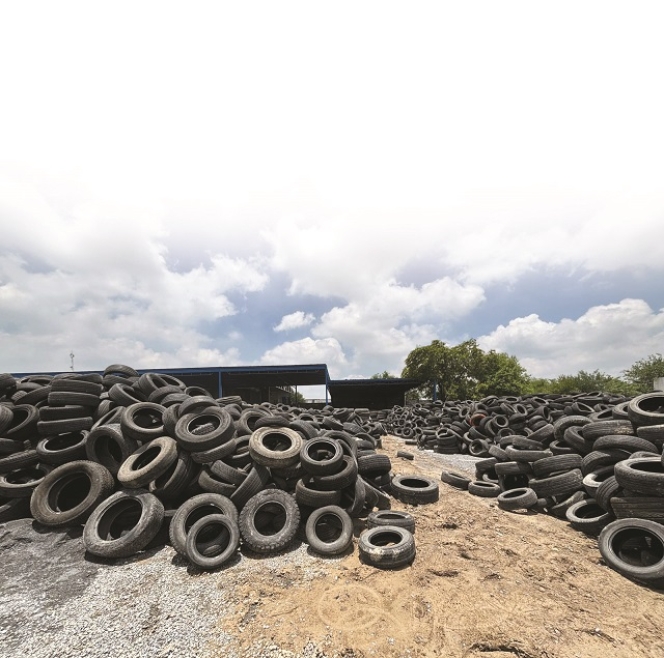Innovent Renewables Opens New Facility To Tackle ELT Issue In Northern Mexico
- By Gaurav Nandi
- January 13, 2025

The pilot facility in Monterrey will initially convert 1 million end-of-life passenger tyres to recovered carbon black. Operations are slated to commence by the end of CY2024, while the company also has plans to add a second train in the future to double the capacity.
Northern Mexico has long struggled with the challenge of end-of-life tyre (ELT) disposal. Decades of improper waste management have led to an accumulation of over 20 million waste tyres, many of which are left in municipal dumpsites or landfills. These discarded tyres pose not only an environmental hazard but also a significant public health risk as they can become breeding grounds for mosquitoes and other disease-carrying pests.
Local governments have ramped up efforts to address this crisis, but the scale of the problem requires long-term, systemic solutions. Innovent Renewables’ new facility in Monterrey is poised to play a key role in this effort. The facility will transform waste tyres into valuable resources such as recovered carbon black and will help reduce landfill reliance, cut carbon emissions and provide a sustainable alternative to the traditional methods of carbon black production.
The pilot facility represents a significant milestone for the recycler as it sets out to address the growing environmental challenge of ELTs in the region. Initially slated to process 1 million waste passenger tyres annually, the facility will convert these tyres into high-quality recovered carbon black, oil and steel. With operations scheduled to begin by the end of calendar year 2024, the company is also looking ahead with plans to add a second processing train to double its capacity in the near future. This expansion marks a critical step in tackling the 20 million-plus tyres accumulated in Mexico’s northern areas while offering sustainable solutions for industries seeking to reduce their carbon footprints.
 “This facility represents a vital step forward in addressing the enormous environmental burden posed by tyre waste in northern Mexico. We’re not only reducing waste but converting it into materials that industries can use in a circular and sustainable manner,” said Chief Executive Officer Vibhu Sharma.
“This facility represents a vital step forward in addressing the enormous environmental burden posed by tyre waste in northern Mexico. We’re not only reducing waste but converting it into materials that industries can use in a circular and sustainable manner,” said Chief Executive Officer Vibhu Sharma.
Extracting value
The tyre recycling process based on pyrolysis begins with the shredding of end-of-life tyres, which are then fed into a main reactor where they undergo pyrolysis, a high-temperature process in the absence of oxygen.
This results in the breakdown of tyre material into pyrolysis gases, oil and recovered carbon black. The gases are recycled within the system for energy recovery or flared off, enhancing energy efficiency.
The pyrolysis oil is condensed and purified, followed by distillation into high-value chemicals for industrial applications. Meanwhile, recovered carbon black, a solid by-product, is processed through milling and polishing for reuse in manufacturing. This design demonstrates an energy-efficient method of converting waste tyres into valuable products such as fuel, chemicals and carbon black.
“Firstly, we have a proprietary continuous pyrolysis process that ramps up and cooks the tyres to decompose them in a particular way. We also use specially designed agitator to ensure uniform decomposition to oil and carbon black. This ensures higher surface area and quality of the RCB. We designed a proprietary polishing unit that crushes that RCB coming out of the reactor and then polishes it to remove metal oxides and silica. We have several equipment in place to capture steel particles in the RCB. The final product still has some amount of silica and metal oxides, but the purity and uniformity of the RCB is much higher,” said Sharma.
Addressing demand
As industries worldwide strive to meet decarbonisation goals, the demand for sustainable alternatives to carbon-intensive materials have surged. Recovered carbon black fits squarely into this trend, offering a viable option for companies looking to reduce environmental impact while maintaining performance characteristics.
Innovent Renewables’ order book reflects this growing interest. The company has secured letters-of-intent from several major tyre manufacturers as well as companies in the printing ink, rubber and paint sectors.
“Increasingly, companies are looking for sustainable solutions that allow them to reduce their carbon footprints without sacrificing the quality of the products. Our RCB gives them that opportunity. It’s a win-win for both industry and the environment,” said Sharma.
He added, “We see the Monterrey facility as just the beginning. As we prove the viability of our process and stabilise operations, we’ll be able to scale up production not just here in Mexico but potentially in other regions around the world that are dealing with tyre waste issues. There’s a huge global need for solutions like this.”
Sustainable vision
According to Sharma, the company’s goal is to provide a circular solution for industries that are serious about sustainability. “It’s not just about the recovered carbon black; we’re also helping companies reduce their reliance on virgin oil and steel by offering them high-quality, recycled alternatives. This allows them to achieve carbon credits and decarbonisation targets while contributing to a cleaner environment,” noted Sharma.
While tyres remain the primary focus, the company is already working to expand its applications into other industries by targeting sectors such as rubber gaskets, printing inks and paints to tap into new growth markets.
It is also finding ways to repurpose the other by-products of its pyrolysis process. The oil extracted from the tyres can be used as fuel or as a raw material for various industrial applications, while the recovered steel can be sold back to manufacturers, creating a fully circular model that maximises resource recovery and minimises waste.
“We’re proud to be part of the solution to one of Mexico’s most pressing environmental issues. But this is just the start. Our vision is to become a global leader in the circular economy, providing industries around the world with the materials they need to build a sustainable future,” Sharma concluded.
Bekaert Secures ISCC PLUS Certification For Steel Tyre Reinforcement
- By TT News
- February 27, 2026

Bekaert has achieved a significant sustainability milestone by securing ISCC PLUS certification for its steel tyre reinforcement products. This accomplishment highlights the company's dedication to driving innovation and working closely with tyre manufacturers to promote the widespread use of materials with high recycled content.
Historically, steel used for tyre reinforcement was not covered by ISCC PLUS. However, a partnership between Bekaert, ISCC and the certification body TÜV NORD successfully developed a structured certification path for tyre cord and bead wire with high recycled content. TÜV NORD played a key role by auditing Bekaert’s Burgos facility during a pilot phase, technically validating that the ISCC PLUS framework could be effectively applied to steel-based products. This validation paves the way for its wider acceptance in the tyre sector.
This certification builds upon the foundation laid by Bekaert’s own Recycled Content Standard, which previously set an industry benchmark for traceability and sustainable practices. The earlier standard's success was instrumental in encouraging ISCC to broaden its certification framework to encompass steel products. Although the Bekaert standard will remain valid during the transition, ISCC PLUS now offers a globally acknowledged system that guarantees uniformity and clear traceability throughout the entire supply chain.
This certification positions Bekaert as a leader in advancing certified tyre reinforcement, fostering industry-wide acceptance and generating shared benefits with tyre makers. For manufacturers, utilising ISCC PLUS-certified materials lends credibility to their sustainability assertions, simplifies the certification landscape and aids in meeting regulatory and market demands. Furthermore, their customers continue to gain from Bekaert’s dependable supply chain, which is now enhanced by verified sustainable sourcing.
Annie Xu, President – Rubber Reinforcement, Bekaert, said, "Achieving ISCC PLUS certification demonstrates our leadership in certified steel with high recycled content for tyre reinforcement. We are proud to have worked closely with ISCC and TÜV NORD to shape this framework, which will help our customers stay ahead of sustainability and regulatory expectations."
An ISCC representative said, "We welcome the successful completion of the certification process for steel tyre reinforcement under ISCC PLUS. This demonstrates that the ISCC framework can be applied to additional material categories while maintaining our established requirements for traceability and verification."
Samir Beqqal, Head of Carbon Traceability Business Entity Sustainability, TÜV NORD CERT, said, "Working with Bekaert and ISCC on this pilot certification was an important step towards applying ISCC PLUS principles to new material categories like steel. We are delighted that we were able to contribute our expertise to this process and help ensure that certified traceability and sustainability assurance can also be effectively extended to industrial materials now.”
Birla Carbon To Present Advanced Carbon Black Portfolio At Tire Technology Expo 2026
- By TT News
- February 26, 2026

Birla Carbon is set to participate in the upcoming Tire Technology Expo 2026, scheduled to take place in Hannover, Germany, from 3 to 5 March 2026. Attendees can find the company at Stand C 224, where it will present its latest innovations in carbon black and sustainable materials. The focus will be on solutions specifically designed to meet the evolving demands of the tyre industry, particularly in enhancing performance while aligning with broader environmental objectives.
The exhibition will serve as a platform to demonstrate how Birla Carbon’s advanced materials contribute to greater tyre durability and fuel efficiency. These developments are especially pertinent for next-generation mobility, including the specific requirements of electric vehicles. The company aims to show tire manufacturers how performance enhancements can be achieved without sacrificing sustainability commitments.
A key theme of their presence will be the strength and agility of their supply network across the EMEA region. By emphasising its robust local manufacturing and distribution framework, Birla Carbon intends to highlight its role as a dependable innovation partner. This infrastructure is built to ensure consistent quality and supply chain resilience, allowing for effective collaboration even in fluctuating market conditions.
Sustainability will be woven throughout the company’s engagement at the expo. Birla Carbon plans to detail its journey towards achieving net zero carbon emissions, spotlighting advancements like its Continua Sustainable Carbonaceous Material (SCM). The widespread ISCC Plus certification across its global manufacturing sites will also be featured, underscoring its commitment to traceable and responsible sourcing practices throughout the value chain.
John Davidson, Chief Sales, Marketing & Sustainability Officer, Birla Carbon, said, “Birla Carbon brings a range of innovative carbon black solutions, backed by its decades of manufacturing leadership, at a time when the industry is focused on maximising tyre performance across diverse mobility requirements. As mobility evolves towards electric and more energy-efficient platforms, carbon black is increasingly becoming a key performance enabler, directly influencing durability, rolling resistance and lifecycle emissions. Tire Technology Expo provides an impactful global platform to demonstrate how our advanced carbon material solutions are engineered for modern mobility and sustainability.”
STA Partners With Community Merchants Nationwide To Launch ‘Friends Shop’ On Sri Trang Friends App
- By TT News
- February 25, 2026

Sri Trang Agro-Industry Public Company Limited (STA) is advancing Thailand’s agricultural digital transformation through its homegrown platform, the Sri Trang Friends application. Launched in 2019 with the vision of providing a comprehensive digital tool for rubber farmers, the platform has since evolved to serve a broader agricultural community, including palm growers. It is designed to streamline access to information, services and various support mechanisms, creating a direct link between the company, farmers and supply chain participants.
A key recent development is the introduction of the Friends Shop feature and the Friends Point rewards system. This enhancement integrates local merchants from communities nationwide into the application, allowing farmers to conduct convenient transactions while helping to lower their daily expenses. The points accumulated can be used as cash equivalents or exchanged for a wide range of benefits, including essential goods and services, thereby stimulating local economic activity. The platform’s utility has also been extended to Sri Trang Group employees and the general public, who can now earn and redeem points for discounts or payments at participating outlets such as supermarkets, fuel stations and coffee shops. This expansion ensures the app delivers practical, lifestyle-oriented advantages to a wider user base.
According to Executive Director Vitchaphol Sincharoenkul, the application was originally conceived under the concept of ‘One App, Complete Services for Rubber Farmers’ to strengthen farmer engagement, improve coordination efficiency and ensure fully traceable and transparent produce trading. Beyond these operational goals, it also opens new marketing channels for local communities and fosters deeper collaboration across the agricultural value chain. The company is actively broadening its network of partners to diversify the benefits and merchant options available to users.
Currently, the Sri Trang Friends platform has attracted over 150,000 registered users, with more than 40 community merchants across various regions either already onboard or preparing to join. This growth underscores the company’s commitment to leveraging a Thai-developed digital solution to empower modern farmers, reinforce local economies and drive sustainable long-term progress within the nation’s agricultural sector.
Himadri’s New Production Line Creates World’s Largest Single-Site Speciality Carbon Black Hub
- By TT News
- February 25, 2026

Himadri Speciality Chemical Ltd (HSCL) has officially launched commercial production at its new 70,000 metric tonne per annum speciality carbon black line in Mahistikry, West Bengal. This brownfield expansion elevates the company’s total carbon black manufacturing capacity to 250,000 MTPA, with 130,000 MTPA specifically dedicated to speciality grades at this single location. As a result, the Mahistikry facility now holds the distinction of being the largest site in the world for speciality carbon black production.
The development represents a pivotal achievement in the company’s strategic roadmap, solidifying its global standing in the advanced materials sector. By significantly increasing its speciality portfolio, the company is better positioned to meet the rigorous demands of high-value industries such as plastics, inks, paints and coatings. The project integrates cutting-edge process technology with stringent quality controls and energy-efficient systems, ensuring that premium-grade products are consistently delivered to an international client base.
Financially, the new capacity is set to positively influence revenue streams and bolster margins over the coming years. The expanded scale not only enhances operational efficiency and supply chain dependability but also accelerates the company’s ability to innovate and respond to market shifts. As worldwide demand increasingly favours tailored, high-performance carbon solutions, this enhanced infrastructure provides a distinct competitive edge through improved agility and product development capabilities.
Anurag Choudhary, CMD & CEO, Himadri Speciality Chemical Ltd, said, “The commencement of commercial operations of our 70,000 MTPA Speciality Carbon Black line at Mahistikry marks the beginning of the next phase of growth in our advanced carbon materials journey. With this expansion, Mahistikry becomes the world’s largest single-location Speciality Carbon Black facility, with a capacity of 130,000 MTPA. This milestone significantly enhances our production capabilities and positions us strongly to capture rising global demand in premium, application-specific segments such as plastics, inks, paints, coatings and other specialised industries. We remain committed to disciplined expansion, operational excellence, sustainability and delivering high-performance solutions that create long-term value for all stakeholders.”







Comments (0)
ADD COMMENT